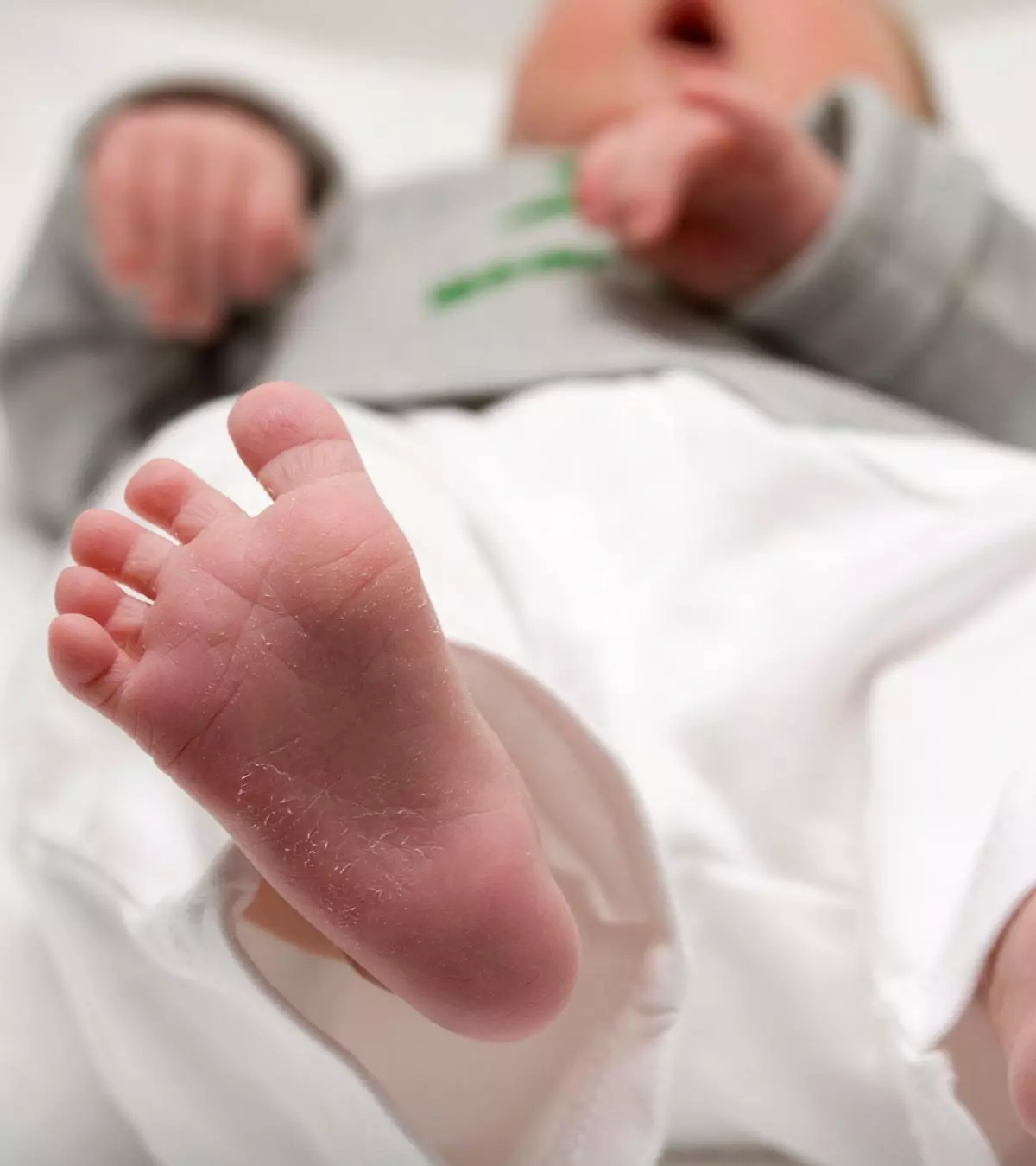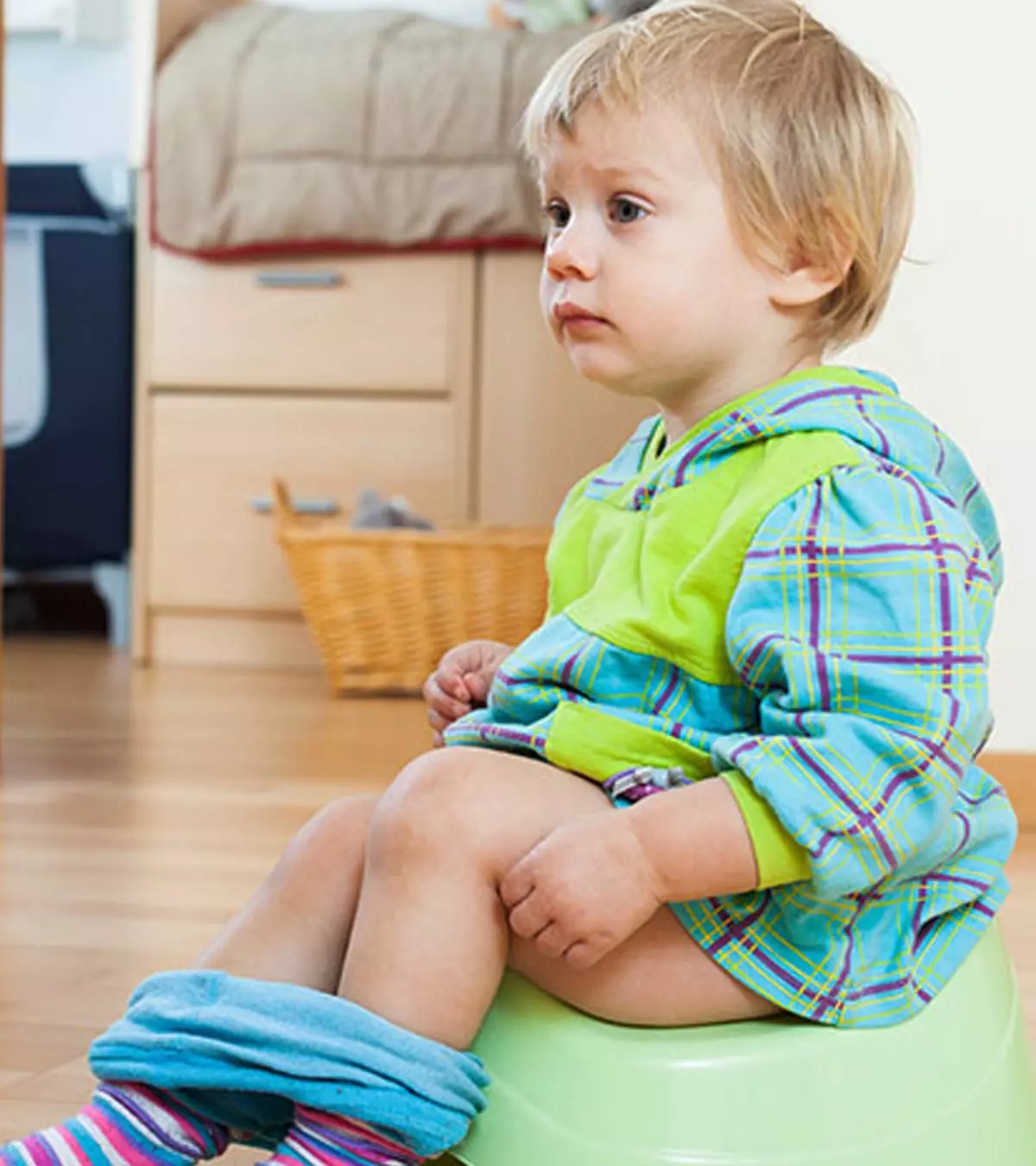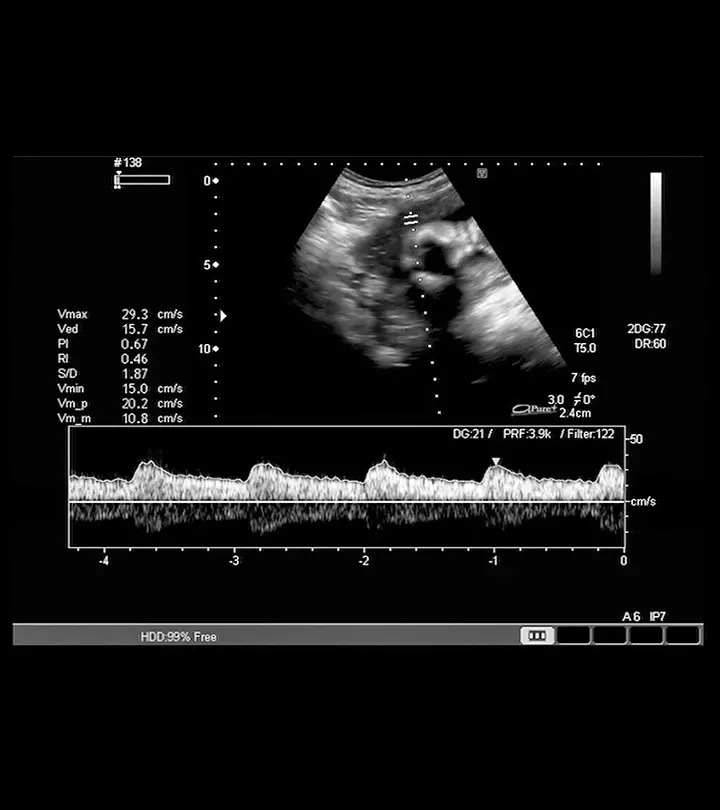
Image: iStock
A baby is constipated if they have difficulty passing stools or have hardened stools. A baby’s constipation may also lead to other issues, such as pain while passing stools and stomach aches. Most infants younger than a year may go days without pooping. Knowing the symptoms of a constipated baby may make it easier for you to differentiate between regular stool motions and constipation (1) (2), and enables you to take prompt action to prevent more serious issues. Read this post to know the causes, symptoms, treatment, and prevention of constipation in babies.
Key Pointers
- When your baby’s expression changes while passing stool, they release gas or have a bloated belly, know that they are suffering from constipation.
- Weaning food, dehydration, and imbalanced formula could be a few common causes of constipation in babies.
- Changing the formula, keeping the baby hydrated, and providing them with juices and high-fiber food can help treat constipation.
What Are The Signs Of Constipation In A Baby?
The primary symptom of a baby’s constipation is hard and dry stools, which usually appear as individual lumps in the diaper. The baby may also show the following signs (1) (2) (3).
- Strain while passing stool; evident from baby’s facial expressions
- Bloated belly due to gas accumulation
- Excessive release of abdominal gas while passing stools
- Increased irritability or crying during bowel movements
Abbey Sharp, a mom and a registered dietitian, writes on her blog, “In my experience, it’s really easy to know when Baby E (Sharp’s baby) is constipated because I hear him grunting, holding his breath and turning red as he bares down to push, and he then usually is very cranky and upset when it doesn’t come (i).”

Severe constipation, which is less common, may have the following symptoms.
- Fecal impaction (hard and stuck stool)
- Encopresis (liquid stool around solid stool)
The reduced frequency of pooping may not always be an accurate indicator of constipation in babies, unlike constipation in children.
Instead, focus on deviation from the usual pattern of pooping and the texture of the stools. Each infant has different pooping patterns, which are best known to the caregivers. If you notice changes in the baby’s pooping routine or diaper changes along with hard, lumpy stool, your baby may be constipated.
What Is The Normal Stool Frequency In Infants?
The normal stool frequency in a baby varies through the first year. Breastfed babies usually pass stools more frequently than those fed on formula due to the easily digestible nature of breast milk. Most newborns have one or two bowel movements in a day and that increases to five or ten per day during the first week of life. After that, the frequency reduces as the baby grows older; they may have a stool frequency of one or two bowel movements a day by the time they become six weeks old (4).
Babies who have begun consuming solid foods may have fewer stools initially. However, the frequency sets back to normal once the gastrointestinal system adjusts to the solid food (5).
What Causes Constipation In Babies?
The following conditions may lead to constipation in babies (3) (6).
- Dehydration may cause constipation during warm weather.
- Unsuitable formula feed or a sudden switch to new formulas may cause temporary constipation.

- Imbalanced formula, such as adding too much powder to water during preparation.
- If a baby is being weaned and older than six months, a lack of fiber in solid food may cause constipation.
- A crack near the anus could make it painful for the baby to pass stools. Hence, they may refuse to poop, leading to constipation.
In rare cases, constipation in infants may occur due to the following underlying problems.
- Congenital anorectal malfunction (defects in the anus or rectum)
- Diabetes insipidus (a disorder where the body produces excess urine)
- Hypothyroidism (thyroid doesn’t produce enough hormones)
- Spinal cord abnormalities
- Hirschsprung’s disease (missing nerve cells in the colon)
- Cystic fibrosis (a condition where a few organs produce thick and sticky mucus)
- Gluten enteropathy or celiac disease (immune reaction to gluten); may be evident in babies on solids
 Point to consider
Point to considerHow Is Constipation In Babies Diagnosed?
A pediatrician usually diagnoses a baby’s constipation through the following procedures (6) (7).
- Historical exam: This includes the baby’s medical history, feeding patterns, or past illnesses. The doctor may question stool frequency and symptoms. If your baby is on formula or solids, the doctor may ask about the type of formula or solid diet you feed your baby.
- Physical exam: The doctor gently palpates the abdomen to check for any stiffness, swelling, or lumps. They may also use a stethoscope to listen to the sounds in the baby’s abdomen.

Most babies can be diagnosed with constipation through these procedures. In rare cases, the doctor may suggest imaging tests (X-rays), blood tests, and urine tests, especially if the cause is suspected to be not related to diet and instead associated with some problem.
What Is The Treatment For Constipation In A Baby?
The following lifestyle changes can help treat constipation in babies (1) (8).
- Bath: A warm bath helps relax abdominal muscles and relieve any tightness.
- Exercise: Light physical activity, such as crawling and tummy time, may stimulate bowel movements. You may place younger babies on their back and bicycle their legs gently to provide assisted exercise.
- Massage: Baby massage can be an effective way to relieve constipation in infants. Specifically, gentle circular massage on the baby’s belly may help stimulate bowel movement.
- Hydration: Ensure that your baby is getting sufficient breast milk or formula. If the baby is older than six months, you may provide them with small amounts of water, especially if the weather is warm.
- Juices: The juice of certain fruits works as a natural laxative. According to experts, for infants over one month, you may give one ounce of fruit juice per month of age per day (one month= one ounce) until their symptoms resolve (9). Apple and pear juice are good choices to alleviate baby constipation. After three months, you may also give prune juice to your baby. Prune juice is usually a popular remedy for constipation. You may give up to 30ml of homemade prune juice. However, do not give more than two ounces in 24 hours. Know how to make prune juice at home here.

- Changing the formula: Consider switching to another type or brand of formula if you suspect it to be a cause of constipation. Consult a pediatrician before changing the formula to ensure your baby gets the right formula milk for nourishment.
- Switching to high-fiber food: If your baby is on solids, provide high-fiber cereals, such as those made with whole wheat, barley, and oats. Other sources of fiber include vegetables, such as beans and broccoli, and fruits, such as apples and berries. Provide vegetables and fruits in steamed and mashed form so that the baby may get adequate fiber. Older babies may be served whole-grain porridges with finely chopped high-fiber fruits on top.
- Laxatives: They are constipation medications, available in oral (liquid and tablets) and rectal (suppository and enema) forms. The four main types of laxatives used to treat constipation include stool softeners, osmotic laxatives, lubricant laxatives, and stimulant laxatives. However, it is essential to note that many of these laxatives, especially stimulant laxatives, are not recommended for babies and young children. You should only use them after consulting a doctor (10) (11).
Do not administer laxatives, enemas, or stool softeners to a baby unless suggested by a doctor. Avoid giving herbal remedies without consulting the doctor. If the above tips do not work, the doctor may consider glycerin suppositories.
When To Call A Doctor?
Consult a doctor if a formula-fed baby has not pooped for more than three days or a breastfed baby has not pooped for more than seven days despite adequate feeding. You must also see a doctor if the baby’s constipation is accompanied by the following conditions (2).
- Blood in the stools
- Vomiting
- Loss of appetite
- Crying or pain while passing stool
- Drowsiness
- Colic or excessive fussiness

Frequently Asked Questions
1. Do babies eat less when constipated?
Babies may have reduced appetite when they are constipated. Sometimes, they may experience bloating along with constipation, making them eat less or feed less than usual. Pain and irritation due to constipation can also be a reason to refuse feeding or eating (12).
2. Are bananas good for constipation in babies?
Bananas are not good for relieving constipation. Usually, applesauce, cereal, and bananas cause constipation in babies. To ease bowel movements, you may try different baby foods that help with constipation, such as oatmeal, barley, plums, and prunes (13).
3. How does introducing solid foods affect constipation in babies?
When a baby is first introduced to solid foods, it may cause constipation or hard stools. Therefore, it is believed that feeding the baby whole wheat or barley cereal might help relieve constipation. However, consult your child’s pediatrician before incorporating new foods into their diet (14).
4. Can teething cause baby constipation?
In a few instances, constipation might be indirectly linked to teething. Due to the teething discomfort, babies may refuse to take sufficient fluids, which could lead to dehydration and constipation (15).
Constipation is a common occurrence in babies. If your baby is feeding well and not in any pain or discomfort, you need not worry. The bowel movements of infants may change as per their age and diet. However, do not hesitate to take your pediatrician’s opinion. See a doctor soon if constipation is accompanied by other potential indicators of underlying problems, such as blood in the stools, vomiting, and poor appetite.
Infographic: How To Manage Constipation In Babies At Home?
Imbalances or unsuitable formula, warm weather, lack of fiber while weaning, and other factors may cause constipation in babies. However, certain lifestyle changes and homecare tips, as listed in the following infographic, can help manage the symptoms. But if your baby is still constipated, take them to a doctor for a thorough check-up. Illustration: Momjunction Design Team
Illustration: Simple And Effective Home Remedies For Baby&039s Constipation

Image: Dall·E/MomJunction Design Team
Having a newborn with constipation can be stressful. Learn what to do if your baby is constipated, including diet changes, home remedies, and when to call the doctor.
Personal Experience: Source
MomJunction articles include first-hand experiences to provide you with better insights through real-life narratives. Here are the sources of personal accounts referenced in this article.
i. Constipation Relief For Baby! Best Foods For Constipation Newborns, Toddlers, And Kids;https://www.abbeyskitchen.com/baby-constipation-relief-best-foods/
References
- Constipation In Infants.
https://www.nationwidechildrens.org/conditions/constipation-infant - Constipation In Infants And Children.
https://medlineplus.gov/ency/article/003125.htm - Constipation And Children.
https://www.betterhealth.vic.gov.au/health/conditionsandtreatments/constipation-and-children - Bowel Movements In Babies.
https://www.mottchildren.org/health-library/abo3062 - Constipation In Babies And Children.
https://raisingchildren.net.au/babies/health-daily-care/poos-wees-nappies/constipation - Evaluation And Treatment Of Constipation In Children.
https://www.aafp.org/pubs/afp/issues/2006/0201/p469.html - Diagnosis Of Constipation In Children.
https://www.niddk.nih.gov/health-information/digestive-diseases/constipation-children/diagnosis - When, What, and How to Introduce Solid Foods.
https://www.cdc.gov/infant-toddler-nutrition/foods-and-drinks/when-what-and-how-to-introduce-solid-foods.html - Constipation.
https://www.childrenshospital.org/alliance/practices/post-road-pediatrics/patient-resources/home-care-advice/constipation - Over-The-Counter Medicines for Infants and Children.
https://www.stanfordchildrens.org/en/topic/default?id=over-the-counter-medicines-for-infants-and-children-1-2804 - Jeremy Meng Dao Ho and Choon How How; Chronic constipation in infants and children (2020).
https://www.ncbi.nlm.nih.gov/pmc/articles/PMC7052003/ - Constipation In Babies.
https://www.pregnancybirthbaby.org.au/constipation-in-babies - Starting Solid Foods.
https://www.ucsfbenioffchildrens.org/education/starting-solid-foods - Botulism Prevention.
https://www.cdc.gov/botulism/prevention/?CDC_AAref_Val=https://www.cdc.gov/botulism/prevention.html - Constipation and Bottle Feeding
https://www.nhs.uk/start-for-life/baby/feeding-your-baby/ - Constipation.
https://www.oregon.gov/oha/PH/HEALTHYPEOPLEFAMILIES/WIC/Documents/cip-constipation-eng.pdf - Botulism
https://www.longwoodpeds.com/patient-education/nutrition/starting-baby-solid-food
Community Experiences
Join the conversation and become a part of our nurturing community! Share your stories, experiences, and insights to connect with fellow parents.
Read full bio of Dr. Anuradha Bansal
Read full bio of Sindusha MS
Read full bio of Dr. Ritika Shah
Read full bio of Ghazia Shah





 Caution
Caution










